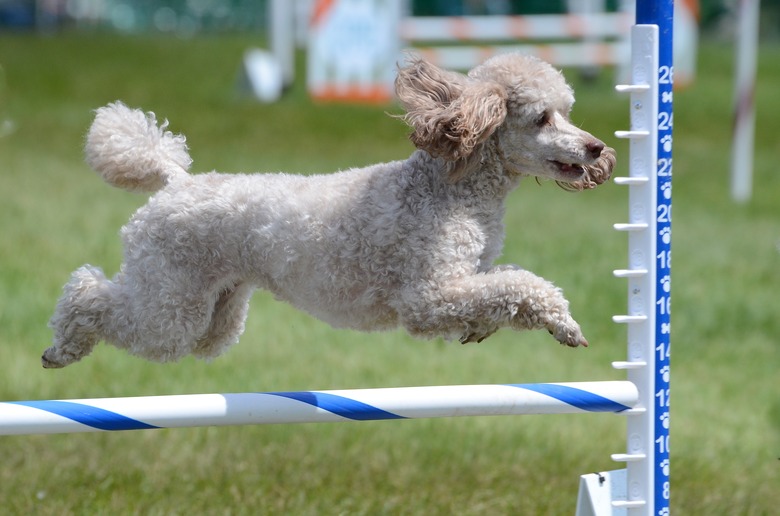Poodle Lifespan: What Is The Lifespan Of A Miniature Poodle?
Poodles are one of the dog breeds that have different sizes of dogs with precise definitions of each size. The miniature is in the middle, between the large standard poodle and the tiny toy poodle. The miniature poodle stands 15 inches or smaller from paws to withers (the highest point of the shoulder bone), while the standard poodle is over 15 inches tall and the toy is 10 inches tall or less. The expected poodle lifespan is between 10 and 18 years, with the miniature poodle's lifespan of an average of 15 years. There are steps you can take to help make sure your miniature poodle lives a long and healthy life.
History of the poodle
History of the poodle
Although poodles are the national dog of France, where they are called "caniche" or duck dog, they actually originated in Germany where they were used in duck hunting. The German word "pudelin" means splashing in water, and standard poodles were used as retrieving water dogs over 400 years ago. They are still great swimmers and enjoy the water, although today's owners probably like how cute their miniature poodles are and that they're such fun companions, more than their water retrieving skills.
Poodle lifespans correlate to size
Poodle lifespans correlate to size
It has been noted for many years that the lifespan of a dog decreases the larger it gets, and more recent studies have shown this to be accurate in most cases, although of course there are exceptions. Therefore, miniature dogs would be expected to live longer than standard sizes, and toy breed dogs would outlive both.
Another study that spanned 20 years and followed many breeds, including standard, miniature, and toy poodles, showed that both miniature and toy poodles live a median of 15 years, while standard poodles live a median of 12 years. Researchers found that larger dogs' bodies aged faster overall, with all of their body systems deteriorating faster. They tended to get arthritis and other joint problems sooner as well as diseases. The leading cause of death for miniatures was cancer, followed by trauma.
Health problems common to miniatures
Health problems common to miniatures
Miniature poodles are prone to orthopedic issues, mainly hip dysplasia and luxating patella. During high levels of activity, such as running and jumping, the knee patella can shift out of place. Legg-Calve-Perthes disease is also common, where the hip ball and socket deteriorate. The cause is uncertain, though it appears to be genetic. The first sign of the disease is a limp, eventually leading to the dog not putting any weight at all on that leg. Eye issues are also common to miniatures. Responsible breeders test dogs for these diseases before breeding them, thus lessening the chance of offspring developing them, but they can still occur.
Food makes a huge difference
Food makes a huge difference
Statistics reveal the average life expectancies, but individual owners want to know how their miniature poodles can beat the odds and live longer. After all, many poodles have lived into their 20s, and it would seem that miniature poodles have a greater chance of doing so. Instead of leaving it up to chance, there are several actions owners can take to help their miniature poodles live longer.
Carefully controlling both the kinds of foods in the dog's diet and the amount of food they consume each day will help keep the dog within a healthy weight. Just as with people, extra pounds contribute to diabetes, heart disease, and other potentially life-shortening problems. According to the Association for Pet Obesity Prevention (APOP), their 2018 survey found that 55.8 percent of dogs were overweight or obese. Some dogs have a tendency to overeat, so it's up to their owners to give portions advised by the dog's vet and to count the calories in treats, too, as different kinds can vary greatly in calories.
Daily exercise is critical
Daily exercise is critical
Closely aligned with calories is making sure miniature poodles get regular exercise. They are active, athletic dogs who enjoy low-impact activities like walking and swimming, which won't put stress on their joints, as well as playing the game of fetch. Fortunately, these activities get their owners outside and exercising as well, surely contributing to their health, too. On rainy and cold days, fetch played indoors will strengthen the bond between owners and their miniatures and make any day more fun.
See a vet regularly
See a vet regularly
Seeing a vet at least annually can prevent serious illness by catching problems at the early stages when they can be treated and reversed more easily. A vet can advise on the type and amount of food to feed and how often, warn owners if their miniatures need to lose or watch their weight, and test for the diseases common to miniature poodles. Vets see the same breeds of dogs over and over, so they have a point of comparison to notice if your pet shows signs of problems. Once you've built a relationship with a vet, they have a record of your miniature's health, visits, and treatments, for a point of reference any time you need advice.


